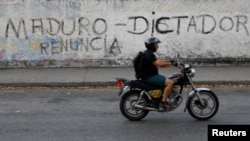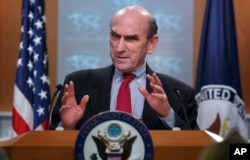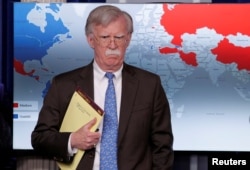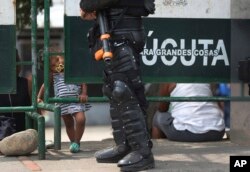U.S. President Donald Trump told reporters Friday in Florida that Venezuela is "a big fat mess," on a day when other White House officials hinted that economic sanctions may be on the way.
Trump took questions from reporters on a wide range of subjects Friday afternoon, including on what the United States will do about Venezuela.
"Venezuela is a big fat mess," Trump said. "Electricity's gone, power's gone, gasoline for cars. When you talk about socialism, take a look at Venezuela."
Earlier Friday, the U.S. special envoy for Venezuela, Elliott Abrams, said Secretary of State Mike Pompeo has a list of options, including economic sanctions, for dealing with the presence of Russian troops in Venezuela. Two Russian air force planes landed outside Caracas last Saturday and were believed to be carrying Russian military personnel and equipment.
"I would just say that we have options and that I think it would be a mistake for the Russians to think they have a free hand here," Abrams told reporters Friday at the State Department.
Asked about Venezuelan President Nicolas Maduro's announcement this week that opposition leader Juan Guaido is banned from Venezuelan politics for the next 15 years, Abrams said, "I don't imagine that Juan Guaido is deeply worried, because the Maduro regime — while it might be around in 15 days, [it] is not going to be around in 15 years. So it's a ludicrous effort on the part of the regime to keep Mr. Guaido quiet."
U.S. National Security Adviser John Bolton spoke to Reuters news service Friday afternoon, just hours after issuing a statement warning other countries not to send military resources to Venezuela.
Questioned about economic sanctions on Venezuela, which were mentioned by the U.S. envoy to Venezuela just hours earlier, Bolton said "we're considering what options to follow through on."
"We're not afraid to use the phrase 'Monroe Doctrine' in this administration," Bolton said, referencing a U.S. policy from 1823 that guarded against foreign interference and colonization.
He said any sanctions on Venezuela would be designed "to prevent the Maduro regime from being able to finance itself."
Humanitarian aid
Meanwhile, the International Federation of the Red Cross and Red Crescent has announced it will begin distributing humanitarian aid in Venezuela, where food, medical supplies, and other necessities are scarce.
The head of the Red Cross, Francesco Rocco, told reporters in Caracas the organization will not allow political interference to keep it from doing its job.
He said the Red Cross should be ready to begin distribution in two weeks. "We hope to help 650,000 people at first," he said.
Aid supplies have been stockpiled just outside the Venezuelan borders in Colombia and Brazil. Maduro has refused to let the aid into the country.
Guaido in February tried to deliver aid to Venezuelans, staging the deliveries in Colombia and Brazil. But Maduro called the efforts an attempted invasion by the United States. Security forces refused the supplies and clashed with protesters at the borders.
Military support
Also Friday, the White House warned nations, including Russia, to not send military resources to Venezuela, while condemning disputed President Maduro's "continued use of foreign military personnel in his attempt to remain in power.
"Maduro will only use this military support to further repress the people of Venezuela; perpetuate the economic crisis that has destroyed Venezuela's economy; and endanger regional stability," Bolton said. "We call on the Venezuelan military to uphold its constitutional duty to protect the citizens of Venezuela."
The White House national security adviser also said the United States "strongly" cautions actors external to the Western Hemisphere against deploying military assets to Venezuela or elsewhere in the hemisphere, with the intent of establishing military operations. The statement says any such actions would be viewed as a "direct threat" to regional security.
On Wednesday, Trump told a reporter several times, "All options are open," in response to a question about whether the United States is willing to put "boots on the ground" to remove the Russians. Trump added that Moscow is well-aware of the U.S. stance.








